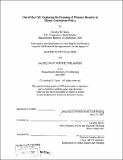Out of the cell : exploring the framing of prisoner reentry in Illinois corrections policy
Author(s)
Harris, Jonathan R., M.C.P. Massachusetts Institute of Technology
DownloadFull printable version (5.557Mb)
Other Contributors
Massachusetts Institute of Technology. Dept. of Urban Studies and Planning.
Advisor
Langley Keyes.
Terms of use
Metadata
Show full item recordAbstract
The significant rise in the prison population in the United States has resulted in a severe shock to the correctional system. Specifically, from 1980 to 2004, the population of offenders incarcerated in state and federal prisons has increased almost five-fold from 315,974 to 1,494,216. As a result, 650,000 prisoners are released back into society each year, placing additional stress on already distressed communities. The ability of released prisoners, or ex-offenders, to successfully reintegrate into society depends to a large degree on the programming made available to them prior to and after their release. However, the cadre of programming offered by prison systems is constrained by the frames that policymakers use to talk about the issue of prisoner reentry. Understanding the frames that people construct are the key to grasping the philosophical foundations underlying current legislation as well as to proffering new policy solutions that are relevant to all stakeholders. This thesis documents both the historical and current frames surrounding the issue of prisoner reentry in Illinois corrections policy, particularly as it relates to the city of Chicago, which takes in 20,000 ex-offenders each year from the Illinois prison system. (cont.) The dominant policy discourse in Illinois is moving away from the crime control frame, which emphasizes punishment and incapacitation of offenders, to what I call the public safety frame, which paints rehabilitation as a mechanism for reducing crime. This re framing has allowed advocates of ex-offenders to gain support for reentry initiatives from Illinois legislators and criminal justice professionals. Yet, with the value of reentry initiatives being tied to crime reduction, advocates of rehabilitation will be under pressure to produce results in the performance-driven environment of the Illinois criminal justice system. The political tenability of rehabilitation as a policy response may very well depend on its ability to align with other frames present in the Illinois discourse.
Description
Thesis (M.C.P. and S.B.)--Massachusetts Institute of Technology, Dept. of Urban Studies and Planning, 2007. "June 2007." Includes bibliographical references (p. 105-108).
Date issued
2007Department
Massachusetts Institute of Technology. Department of Urban Studies and PlanningPublisher
Massachusetts Institute of Technology
Keywords
Urban Studies and Planning.